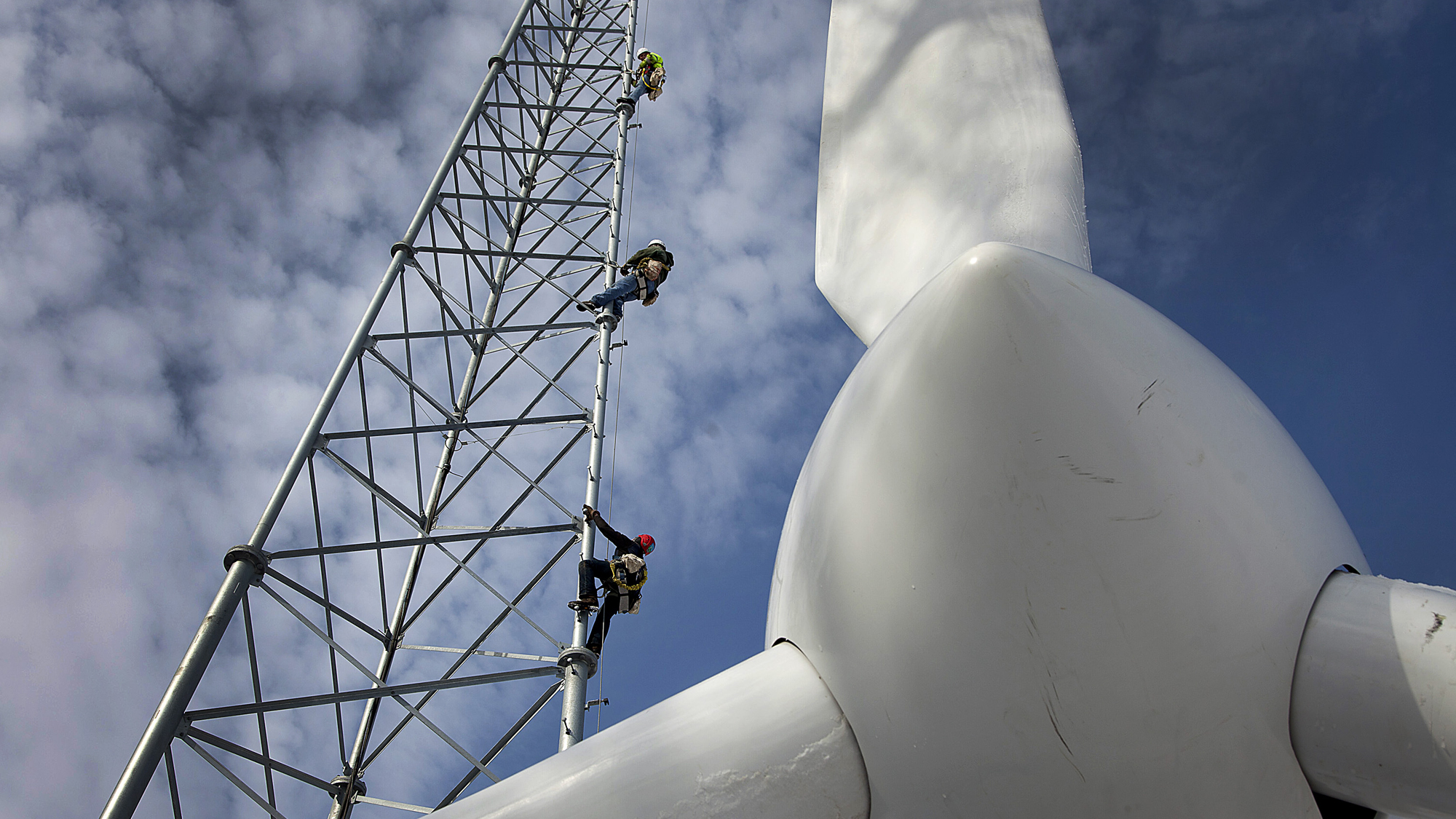America's most in-demand job
And more of the week's best financial insight

A free daily email with the biggest news stories of the day – and the best features from TheWeek.com
You are now subscribed
Your newsletter sign-up was successful
Here are three of the week's top pieces of financial insight, gathered from around the web:
America's most in-demand job
"Wind-turbine service technician" is the hottest job in the U.S., said Matthew Boyle in Bloomberg Businessweek. Job postings for wind-farm techs have risen sixfold since 2018, and employment is expected to continue to grow by almost 45% over the next decade, "faster than any other occupation," according to the Bureau of Labor Statistics. Nurse-practitioner jobs are right behind in terms of expected growth, with data scientists and statisticians coming next. All those are less likely to cause vertigo. Experienced turbine techs can make $80,000 a year, and a college degree is not a requirement. But "those with a fear of heights need not apply." Training for the job can "include rappelling off water towers," and candidates must be able to "lug 50 pounds of gear up long ladders to confined spaces" up to 300 feet in the air.
Higher interest for late taxes
The IRS is raising the interest rate on estimated-tax underpayments, said Ashlea Ebeling in The Wall Street Journal. As of Oct. 1, taxpayers who under-withhold, or small-business owners who fail to make payments on a quarterly basis, will be charged 8% interest. That’s up from 3% two years ago. The change is "particularly relevant for gig workers and consultants who don’t have taxes withheld" in their paychecks. Another "common scenario in which taxpayers get tripped up is when wage earners" decide midyear to start a business and might not be aware that they "are subject to quarterly estimated tax payments." The change could also affect other taxpayers with bonuses, stock options, or significant dividend income. The IRS "assessed more than $1.8 billion in penalties for underpaying estimated taxes on 12.2 million individual returns" last year.
The Week
Escape your echo chamber. Get the facts behind the news, plus analysis from multiple perspectives.

Sign up for The Week's Free Newsletters
From our morning news briefing to a weekly Good News Newsletter, get the best of The Week delivered directly to your inbox.
From our morning news briefing to a weekly Good News Newsletter, get the best of The Week delivered directly to your inbox.
Lower EV subsidies for 2024
Several EVs will get much more costly starting on Jan. 1, said Andrew Hawkins in The Verge. "Electric vehicles with batteries that contain minerals and materials sourced from China won’t be eligible for the $7,500 federal EV tax credit," starting in 2024. That means "a lot of EVs are about to lose their" financial appeal. Ford confirmed last week that its electric Mustang Mach-E is one of them. The Nissan Leaf and Volkswagen ID.4 are affected as well. "Tesla is also warning customers that certain version of its Model 3 — the Rear Wheel Drive and Long Range trim — will only be eligible for half of the $7,500 tax credit."
A free daily email with the biggest news stories of the day – and the best features from TheWeek.com
-
 The ‘ravenous’ demand for Cornish minerals
The ‘ravenous’ demand for Cornish mineralsUnder the Radar Growing need for critical minerals to power tech has intensified ‘appetite’ for lithium, which could be a ‘huge boon’ for local economy
-
 Why are election experts taking Trump’s midterm threats seriously?
Why are election experts taking Trump’s midterm threats seriously?IN THE SPOTLIGHT As the president muses about polling place deployments and a centralized electoral system aimed at one-party control, lawmakers are taking this administration at its word
-
 ‘Restaurateurs have become millionaires’
‘Restaurateurs have become millionaires’Instant Opinion Opinion, comment and editorials of the day
-
 Health insurance: Premiums soar as ACA subsidies end
Health insurance: Premiums soar as ACA subsidies endFeature 1.4 million people have dropped coverage
-
 Anthropic: AI triggers the ‘SaaSpocalypse’
Anthropic: AI triggers the ‘SaaSpocalypse’Feature A grim reaper for software services?
-
 Currencies: Why Trump wants a weak dollar
Currencies: Why Trump wants a weak dollarFeature The dollar has fallen 12% since Trump took office
-
 Companies are increasingly AI washing
Companies are increasingly AI washingThe explainer Imaginary technology is taking jobs
-
 Elon Musk’s starry mega-merger
Elon Musk’s starry mega-mergerTalking Point SpaceX founder is promising investors a rocket trip to the future – and a sprawling conglomerate to boot
-
 TikTok: New owners, same risks
TikTok: New owners, same risksFeature What are Larry Ellison’s plans for TikTok US?
-
 Trump wants a weaker dollar, but economists aren’t so sure
Trump wants a weaker dollar, but economists aren’t so sureTalking Points A weaker dollar can make imports more expensive but also boost gold
-
 Will SpaceX, OpenAI and Anthropic make 2026 the year of mega tech listings?
Will SpaceX, OpenAI and Anthropic make 2026 the year of mega tech listings?In Depth SpaceX float may come as soon as this year, and would be the largest IPO in history